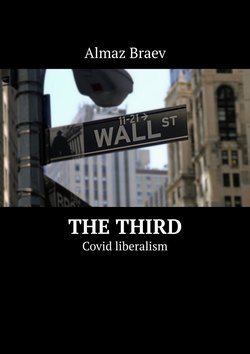Читать книгу The Third. Covid liberalism - Алмаз Браев - Страница 6
CHAPTER III
ОглавлениеWHY IS THE ELDEST SON A FASCIST AND THE YOUNGEST A COMMUNIST
What do we know about fascism? We know from Soviet dictionaries that fascism is a reactionary movement of the petty bourgeoisie. Fascism is represented as a negative, a misanthropic current of morality.
The birthplace of the fascist movement is considered to be Italy in the 20s.
But most of all, fascism is associated with the Nazi regime of the Third Reich.
The fascist States profess the monopoly of the state, in plain language, state monopoly capitalism. In other words, they do not deny market relations, but try to put market anarchy under the control of the Nazi idea. The ideological officials, in this case the Nazi officials, were opposed to the cosmopolitan exchange. In this way, elements of paternalism became apparent in the fascist movement. In fact, Nazism turned out to be a continuation of the German feudal tradition. No one was surprised at what was said? One will grow out of the other, no wonder. For what reason it was so hypertrophied, this is a question of another topic. But German statism or a tilt toward state interests did not appear out of thin air. German statism came from German culture, which in turn came from German history. Here, of course, it is appropriate to recall the economic lag in Germany’s development, as its former fragmentation left the Germans without colonies, and therefore without additional resources. Yes, it is. But how German culture turned into the militarization of the Germans. Were it not the Germans themselves, their Dukes, barons, and counts, who most resisted unification? Autarky of the autarky. Similarly, the militarization has occurred from traditional German feudalism. The German official turned out to be almost a German medieval knight. But why did he become a Nazi instead of a cosmopolitan stockbroker, as happened in other civilized Europe?
Big brother.
How could a German family contribute to this?
How did a German official become wildly belligerent?
We could turn to the German tradition. To find the origins of statism in it. We found it in German feudalism. Others will say, why didn’t the same statism manifest itself in Europe in another dream? A radical tilt towards state interests is not only a disease of the Germans. But it was among the Germans that it became radical. Absolutism seems to grow out of absolutism. Totalitarianism from totalitarianism. Paternalism, from paternalism. Nothing is superfluous. So, what is the reason?
Any European father passes the inheritance to the eldest son. Not just German. This eldest son not only inherits lands and things, he passes on the habits of the family to his children. This is how the tradition develops, and this is how the people turn out. Fathers look at their older sons, and their sons try to adopt their father’s look. They imitate him in everything. The transmission from generation to generation of the father’s character, behavior, and style creates this nation. When fathers saw that to the eldest sons (namely, the eldest!) not enough land, not enough inheritance, they armed themselves and went on a campaign. Thus the entire feudal people armed themselves. But the ideologues were the eldest sons, the ones who take over and pass on the tradition from father to son.
In fact, the German official Nazi was not a feudal Lord in disguise, but a new copy of him. He was the eldest son of a German burgher. Throughout Europe, fathers passed on their covenants in the same way, through their elders. It was the older ones who were the heirs of the tradition, and of the property as well. That the people did not turn off the path trodden by their ancestors, and in the end did not disappear as a people, just all the older sons watched this. Some seniors grew old and passed them on to other seniors. Those in turn also grew old, but managed to teach their older sons. All these operations are somehow connected with the earth. There is an invisible connection, a sacred unity of tradition with the aristocracy. The only career for the eldest son is an honorary military career. All the officers in the army are the eldest sons. So why, with the advent of the market, would these senior officers not support the Nazi idea? Younger sons also became officers. If the eldest inherited all the property. The younger ones, having entered the military service, supported the very institution of the traditional family and society.
In the all Europe of the 20s and 30s was ruled by the military. Many modes: in Hungary (Admiral Miklos Horti), Romania (Marshal Antonescu), Poland (Marshal Pilsudski), Portugal (General De Costa), Spain (Generalissimo Franco) did not grow up to Nazism, to the ideology of total superiority, but were authoritarian regimes, dictatorships. But they were very similar to the German regime.
If you have noticed the connection of right-wing totalitarianism, right-wing statism with the entail, that is, with the institution of inheritance to the eldest sons, then now look at what the younger sons are doing at this time.
I would like to ask you to take a particularly close look at Russia. In addition will have to be considered in the development of the movement of anarchists from Italy, Spain and Russia have the same problem. This problem is not so much about bringing anarchism into the arena a little earlier than authoritarian and totalitarian regimes, but rather about getting the problem of younger sons out. In other words, any left-wing and other protest and themes of equality and social justice are tied to the problems of inheritance and the lack of it in the youngest.
«The old man has three sons: the Eldest was a clever fellow, the Middle son was a fool.…
